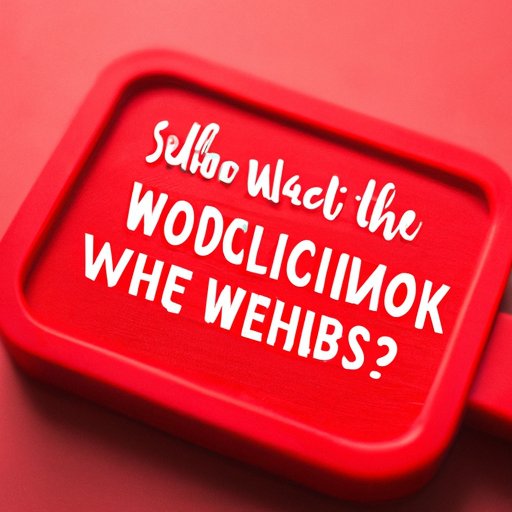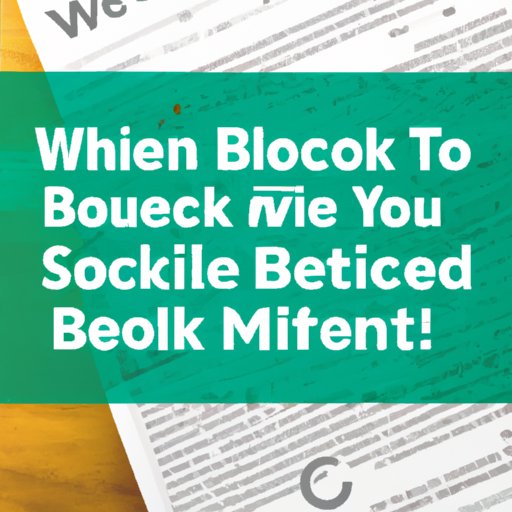
Introduction
Social media has transformed the way we communicate and interact, but it also presents a new set of challenges. One common issue that many people face is being blocked by someone on social media. If someone blocks you, it means that they have taken measures to prevent you from seeing their content and communicating with them. In this article, we will explore the psychological impact of being blocked, offer coping strategies, examine the reasons why people block, and investigate the potential consequences of blocking and being blocked.
The Psychological Impact of Being Blocked Online: Understanding the Effects and Coping Strategies
Being blocked on social media can have a significant emotional impact on a person. It can lead to feelings of rejection, isolation, and even low self-esteem. For some, being blocked can be especially painful if they had a close relationship or considered the person who blocked them to be a friend. Coping with the emotional weight of being blocked can be a challenge, but there are strategies you can use to help you manage.
One helpful strategy is to remind yourself that being blocked doesn’t define your worth or your relationships. It’s important to remember that social media provides only a limited snapshot of a person’s life and interactions. If you are struggling with the emotional impact of being blocked, consider talking to a trusted friend, family member, or mental health professional.
Navigating Social Media in the Age of Blocking: A Guide to Handling Being Blocked
It’s essential to be mindful of your social media behavior to avoid being blocked. Here are some tips to help you avoid being blocked:
- Avoid posting inappropriate or offensive content
- Be respectful when communicating with others online
- Don’t spam people with messages or friend requests
- Avoid getting involved in heated debates or arguments
- Take breaks from social media when you feel overwhelmed or reactive
If you do get blocked, it’s important to accept the decision and move on rather than continually trying to contact the person who blocked you.

What Happens When You Get Blocked on Social Media: A Look at the Consequences
When someone blocks you on social media, several consequences can come with it. For example, you will no longer be able to view the person’s content or profile. You’ll lose access to any messages or conversations you had with them. You won’t be able to tag them in posts or see any posts they may have tagged you in. Being blocked can also impact your online reputation among mutual friends.
From Unfriend to Block: A Deeper Dive into What Blocking Someone Really Means
It’s essential to understand the difference between unfriending and blocking someone. Unfriending someone means they will no longer be on your friend’s list, but they can still view your content and profile. On the other hand, blocking someone means that they will be completely cut off from accessing your profile and content. The decision to block someone is more extreme than unfriending as it is a way of stopping all communication and interaction.
The Art of Blocking: Examining the Reasons Why People Block and the Ramifications for Doing So
People block for various reasons, and some of the most common reasons include:
- Protecting their privacy
- Avoiding unwanted messages and interactions
- Ending a relationship or friendship
- Stopping bullying and harassment
- Preserving mental health and well-being
While blocking can be an effective tool for protecting oneself, it can also have ramifications. For example, blocking someone may lead to a complete breakdown in a relationship or damage to one’s online reputation.
Blocking Bullying: How Blocking on Social Media Can Help Protect Yourself From Online Harassment
Blocking can be a powerful tool for protecting oneself from online harassment. If someone is harassing you online, blocking them can prevent them from having access to your profile and content. It’s important to recognize the signs of online harassment, such as repeated unwanted messages, derogatory comments, or personal attacks. If you are experiencing online harassment, blocking the harasser can be an effective way to protect your mental health and well-being.
The Power Dynamics of Blocking: A Study of Who Blocks Whom and Why
The decision to block can also reveal power dynamics at play in online interactions. Celebrities may choose to block fans who are overly intrusive, while bosses may block employees who engage in inappropriate online behavior. Blocking can be a way for individuals to assert their power in relationships and establish boundaries.
Conclusion
Being blocked on social media can be a challenging and emotional experience, but it’s important to understand the reasons behind it and how to cope with it. By being mindful of your social media behavior and taking steps to protect yourself, you can successfully navigate the complex world of social media interactions. Ultimately, understanding blocking and its potential consequences can help us cultivate healthy online relationships and promote mutual respect and understanding.





